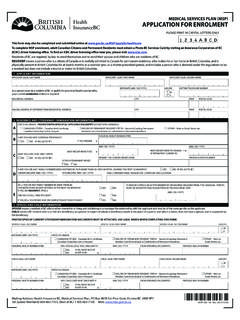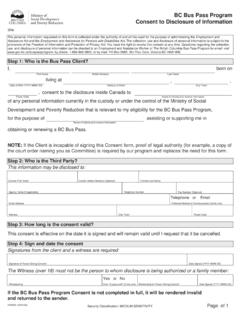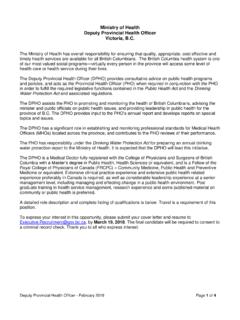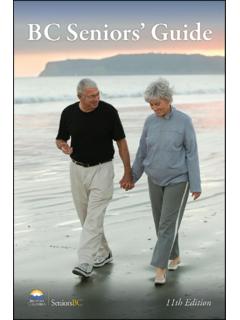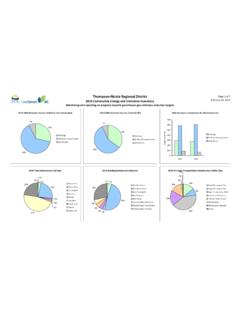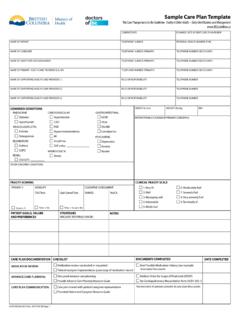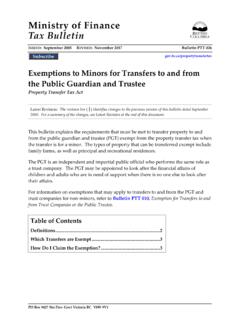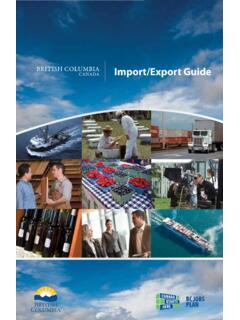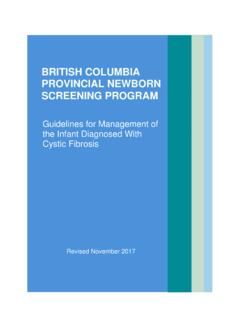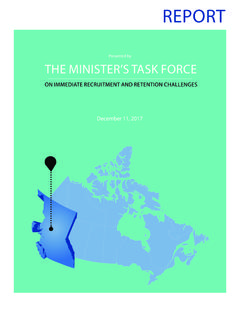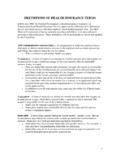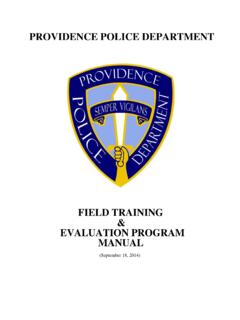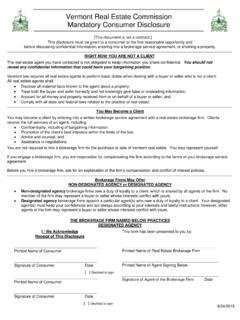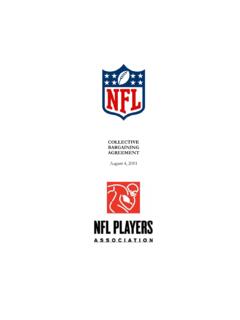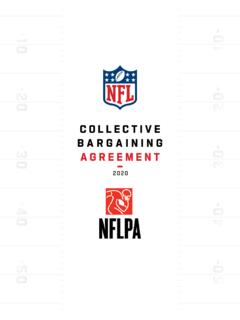Transcription of 2022: Bargaining Unit Benefits Guide - British Columbia
1 Benefits Guide . A Guide to Benefits for Bargaining Unit Employees in the BC Public Service Effective January 1, 2022. INTRODUCTION TO Benefits FOR Bargaining UNIT 4. VALUE OF YOUR Benefits PROGRAM .. 4. PROGRAM OVERVIEW .. 4. The plans .. 4. WHO IS ELIGIBLE FOR Benefits ? .. 5. Employees .. 5. Spouse .. 5. Dependent 6. Dependent children over 19 .. 6. WHEN DOES COVERAGE BEGIN?.. 7. HOW TO 8. How to enrol for the first 8. HOW TO UPDATE YOUR COVERAGE .. 11. Benefits AT A 13. MEDICAL SERVICES 15. EXTENDED HEALTH PLAN .. 16. Overview .. 16. Reimbursement .. 16. What's covered by your extended health plan? .. 16. Extended health general exclusions .. 23. Out-of-province/out-of-country emergency coverage under the extended health group plan.
2 24. Out-of-country non-emergency coverage .. 27. PRIOR AUTHORIZATION AND SPECIALTY DRUGS .. 28. How prior authorization works .. 28. Specialty drug program .. 29. Prescription drug coverage: BC Public Service extended health 30. 1. DENTAL PLAN .. 33. Overview .. 34. Basic services .. 34. Major services .. 36. Orthodontic services .. 37. Dental general limitations .. 37. LIFE INSURANCE PLANS .. 38. Overview .. 38. Employee Basic Life Insurance (to age 65) .. 40. Other Benefits included in the Employee Basic Life Insurance plan .. 41. Optional life insurance plans .. 42. Accidental Dismemberment & Loss of Sight coverage and Optional Accidental Death &. Dismemberment coverage 47.
3 HOW TO MAKE A 47. GroupNet .. 47. Pay Direct .. 49. Extended health and drugs .. 49. Dental .. 49. Life Insurance .. 50. Coordination of Benefits .. 50. WORK STATUS CHANGES .. 51. WHEN DOES COVERAGE END? .. 56. Extended health and dental plans .. 56. Employee Basic Life and Optional Family Funeral Benefit .. 56. Optional Life and Optional AD&D 57. Coverage for eligible dependants .. 57. 2. Converting to individual Benefits plans .. 57. GLOSSARY .. 59. CONTACTS AND RESOURCES .. 63. 3. INTRODUCTION TO Benefits FOR Bargaining UNIT EMPLOYEES. This Guide provides a comprehensive overview of the health and life insurance Benefits program for Bargaining Unit employees.
4 Share the details with your family so you can make the most of your Benefits program. The information provided in this Guide is intended to accurately summarize the terms and provisions of the Bargaining Unit Benefits Plan. In the event of any conflict between the contents of this Guide and the actual plans, contracts or regulations, the provisions outlined in those documents apply. VALUE OF YOUR Benefits PROGRAM. Benefits are an important part of your total compensation package. There's no cost to you to participate in the Extended Health and Dental Plan. The reimbursements you receive under the plan for eligible items and services are paid for by the employer (up to plan limits).
5 The Employee Basic Life Insurance Plan provides employee life insurance at a reasonable group premium rate and a portion of your premium is paid by your employer. On average, your Benefits add over 20% to your overall compensation. PROGRAM OVERVIEW. Your health and life insurance Benefits program consist of the following benefit plans that fall into the categories of Core and Optional plans. Employee Basic Life Insurance is mandatory . You can waive coverage in any of the remaining plans. The plans Core Benefits Extended health plan Dental plan Employee Basic Life Insurance ( mandatory , but ends when you turn 65). Optional Benefits Optional Family Funeral Benefit Employee Optional Life Insurance Spouse Optional Life Insurance Child Optional Life Insurance Employee Optional Accidental Death & Dismemberment Insurance 4.
6 Spouse Optional Accidental Death & Dismemberment Insurance Child Optional Accidental Death & Dismemberment Insurance WHO IS ELIGIBLE FOR Benefits ? Employees This Benefits program applies to: Regular Bargaining Unit employees, including part-time employees Auxiliary employees who've completed 1,827 hours of work in 33 pay periods with the same ministry Auxiliary employees (BCGEU only) who have worked 3 consecutive years with the same ministry without a loss of seniority and have 1,200 hours of straight time in the past 26 pay periods Auxiliary employees who are not eligible for health and welfare Benefits receive a compensation allowance as calculated in accordance with the main agreement You must enrol to be eligible for coverage.
7 You can extend your Benefits to your spouse and to children who meet eligibility requirements. You must enrol your dependants to receive coverage. Spouse Your legal or common-law spouse (same or opposite sex) who's living with you is eligible for coverage. By enrolling your common-law spouse in your Benefits plans, you're declaring that person as your common-law spouse, and that you've been living in a common-law relationship or cohabiting for at least 12 months. The cohabitation period may be less than 12 months if you claimed your common-law spouse's child/children for tax purposes. A separate form is not required. If your spouse is also a BC Public Service employee or is enrolled in a Benefits program with an employer outside of the BC Public Service, you can both enrol in your Benefits plans, listing the other as a dependant.
8 You may be able to submit your extended health and dental receipts to both plans and receive up to 100% reimbursement (to plan limits) of your eligible expenses. If you separate from your spouse, they're no longer eligible for coverage under your Benefits plan. Any terms and conditions under separation and divorce agreements are the responsibility of the employee, not the employer. Once a common-law spouse has been enrolled in your Benefits plan, a different common-law spouse and any eligible dependants may be enrolled in the plan 12 calendar months after you've cancelled coverage for the previous common-law spouse and applicable dependants. The waiting period doesn't apply when you are going from legal spouse to a common- law spouse, legal spouse to legal spouse, or common-law spouse to a legal spouse.
9 You're responsible for cancelling your spouse's coverage when they're no longer eligible for coverage. 5. Dependent children Children (natural, adopted, stepchildren or legal wards) are eligible for coverage if they're unmarried/not in a common-law relationship, mainly supported by you, dependants for income tax purposes, and any of the following: Under the age of 19. Under the age of 25 and in full-time attendance at a school, university or vocational institution which provides a recognized diploma, certificate or degree Mentally or physically disabled and past the maximum ages stated above. This only applies if they became disabled before reaching the maximum ages, if the disability has been continuous, and if the child is covered as a dependant on the employee's Benefits when disabled dependant status was approved.
10 The child, upon reaching the maximum age, must still be incapable of self-sustaining employment and must be completely dependent on you for support and maintenance Residing with your former spouse who is not eligible for health and dental coverage A grandchild is not an eligible dependant unless adopted by, or a legal ward of, the employee or the employee's spouse. Dependent children over 19. Extended health and dental coverage for a dependent child will automatically end on the date your child turns 19, unless you certify that your child is in full-time attendance at a school, university or vocational institution which provides a recognized diploma, certificate or degree.
